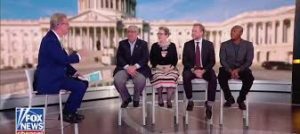Capital Public Radio – Sacramento (6/2/18)
Republicans are at risk of being shut out of California’s races for governor and U.S. Senate on Tuesday.
Democrats could face the same fate in several congressional races seen as crucial to retaking the House of Representatives.
It’s called the “Jungle Primary” for a reason.
Tuesday’s primary election has political watchers riveted — not just because of what’s on the ballot, but also because of the state’s unusual primary system.
And as California’s top-two primary system enters its fourth election cycle, the state is split on whether it’s working as its backers promised.
It all began when 54 percent of California voters approved Proposition 14 in 2010.
Then-Gov. Arnold Schwarzenegger took a victory lap on the steps of the state Capitol the day after the measure passed.
“It will give power back to the people,” he said. “We’ve got to get rid of that partisan gridlock, and this Proposition 14 will do that.”
The system it created is similar to what’s used in Louisiana, Washington and Nebraska: Every voter gets the same primary ballot with all the candidates on it, and the top-two finishers in each race — regardless of political party — move on to the general election.
“The Republican Party and the Democratic Party despise this,” Schwarzenegger said that day. “Why? Because it takes power away from them and gives it back to the people.”
Eight years later, the parties are still ticked off.
A New York Times article last week quoted the House Majority Leader, Kevin McCarthy (R-Bakersfield), as saying “I hate the top two.” And the current California Democratic Party chairman, Eric Bauman, calls it “the worst election reform” the state has ever adopted.
“It was sold to the public that it would moderate our Legislature and our congressional delegation,” Bauman said. “It has not done that. And in point of fact, it has often had the opposite effect.”
Unsurprisingly, that’s not a unanimous view.
“The evidence is kind of mixed,” said Eric McGhee with the Public Policy Institute of California, who’s studied the system since its inception.
He says voters — especially independents, who register here as “no party preference” — have more choices now. That was one of Proposition 14 supporters’ main arguments.
“But there’s some other things that they argued that really haven’t come to pass,” McGhee said. “The turnout really isn’t higher. We don’t see a lot more moderation — just a little bit, and some of it is caused by other things,” such as ballot measures that loosened term limits for state lawmakers and created a citizens’ redistricting commission to squelch gerrymandering.
McGhee says there’s some evidence that some Democrats in the state Legislature have become more moderate, but not legislative Republicans — and not either party in the state’s congressional delegation.
But the system does have fans across the political spectrum. The California Chamber of Commerce, for example, has used the system to elect more moderate Democrats to the Legislature.
“I think we made the right decision at the time,” said chamber president Allan Zaremberg. “And in hindsight, a number of years later, I still think it’s the right decision.”
And freshman Rep. Ro Khanna (D-Fremont) credits the top two system for helping him defeat an eight-term incumbent.
“I think it’s fantastic because it gives independent voters a voice in the process,” Khanna said. “My belief is the future of the progressive movement has to be a coalition between Democrats, independents, third party candidates — and this top two system does that.”
Still, there’s evidence it’s not working as designed.
Supporters hoped that when, say, two Democrats advanced to a general election, Republicans would pick the more moderate one. Instead, McGhee says, “a lot of Republicans — somewhere between a third and a half — just aren’t going to vote in that race.”
Polls suggest voters like the top-two system — even though they may still be figuring it out. Kim Alexander with the California Voter Foundation notes the state has churned through a lot of other primary systems.
“We’ve had closed primaries, we’ve had open primaries, we’ve had partially ajar primaries — that’s one of my favorites,” she said. “And what I really wish is that we would just stick with something for a while and let voters get used to it.”
